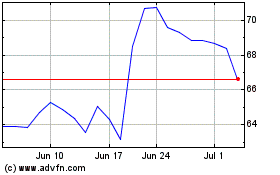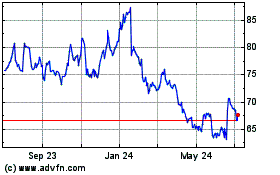2nd UPDATE: Pharmacies Turn Tamiflu Pills To Liquid
March 01 2011 - 1:45PM
Dow Jones News
The nation's top retail pharmacies are starting to convert
Tamiflu capsules into liquid form as demand for that version of the
antiviral medication has outpaced supply.
The Food and Drug Administration first noted short supply of
Tamiflu oral suspension, used by children and patients who have
difficulty swallowing capsules, or when lower doses than available
in Tamiflu capsules are required, in mid-January. The agency said
at the time that the liquid was on back order, but said that
supplies still remained at distributors, wholesalers and
pharmacies, and that all three dosages of Tamiflu capsules remained
available.
Walgreen Co. (WAG) in a press release on Tuesday said flu
activity is on the rise and widespread in 44 states, citing
statistics provided by the Centers for Disease Control and
Prevention. According to Google's Flu trends website, flu activity
in February, typically the peak flu month, was the highest since
2008, although the fall of 2009 saw a massive surge with the global
H1N1 flu scare.
Pharmacists are trained in compounding, or the mixing or
changing of drugs to meet a patient's needs. Walgreen said Tuesday
pharmacies in all 50 states are prepared to compound capsules into
the liquid form and "many" already have, as the pills remain in
adequate supply.
Compounding of drugs, including Tamiflu, "happens from time to
time," according to Walgreen spokesman Jim Cohn. Cohn said studies
show about 1% of annual prescriptions need to be compounded, for
one reason or another, and this year's Tamiflu compounding is
unlikely to change that.
CVS Caremark Corp. (CVS) spokesman Mike DeAngelis said some of
CVS' pharmacies have also begun to compound Tamiflu when necessary.
Although CVS isn't tracking the compounding, he said it is fair to
characterize the incidence of compounding as still small at this
point.
Walgreen's Cohn couldn't immediately speak to how many Tamiflu
prescriptions have been compounded, or if the drugstore expects to
see any change to its revenue or earnings as a result of the
conversion process.
Ashley Flower, a spokeswoman for smaller rival Rite Aid Corp.
(RAD), said the company's pharmacists have been "doing a lot of
compounding."
CVS's DeAngelis said the cost of the compounded medication is
determined by how many Tamiflu capsules are necessary in the
preparation. Rite Aid's Flower said that means the compounded
liquid may or may not be more expensive, though she noted that many
insurance providers will cover any excess cost a patient incurs
from the compounding.
Tamiflu was developed by Gilead Sciences Inc. (GILD), which
licensed it to Roche Holding AG (RHHBY, ROG.VX) for royalty
payments. The drug, produced by Roche's Genentech unit, is taken
when symptoms first emerge to reduce the spread of the flu virus in
the body, and can therefore shorten the duration of the
illness.
Genentech spokeswoman Tara Iannuccillo said the company saw an
unexpected spike in demand for the oral suspension formulation
early in the flu season, but isn't sure what caused the increased
use and is "still trying to understand why this happened." Tamiflu
sales in the United States were CHF40 million in the fourth
quarter, down from CHF400 million a year earlier.
She said the company won't be producing more of the drug this
flu season, but it will be available again in the June. There is
"ample supply" of the capsule formulation--described as "millions
of courses of treatment"--and no shortage is expected, Iannuccillo
said.
Rite Aid, which is trying to put major struggles behind it,
separately on Tuesday announced it has regained compliance with the
New York Stock Exchange's continued listing standards by continuing
to sport a stock price above $1 a share.
Walgreen, meanwhile, has seen sales strengthen, with same-store
sales climbing 6.1% in January, helped by a 6.9% gain at the
pharmacy. The company has outperformed its sector of late after
rolling out a series of store renovations.
CVS, meanwhile, has struggled to achieve the hoped for success
of its $27 billion acquisition of pharmacy-benefits service
Caremark, and some analysts and observers have speculated a divorce
could lie ahead absent a quick turnaround under new Chief Executive
Larry Merlo, who assumed that role on Tuesday.
Walgreen shares were recently up 38 cents at $43.72 and are up
23.4% in the past year; CVS was up 21 cents at $33.27, but its
shares are down 3.3% over the past 52-weeks amid its Caremark woes.
Rite Aid was off 2 cents at $1.29 and is off 14.6% in the past
year, but the stock has rallied 38.6% in the past three months as
concerns over Rite Aid's heavy debt burden have eased.
-By Maxwell Murphy, Dow Jones Newswires; 212-416-2171;
maxwell.murphy@dowjones.com
-Thomas Gryta and Matt Jarzemsky contributed to this
article.
Gilead Sciences (NASDAQ:GILD)
Historical Stock Chart
From Jun 2024 to Jul 2024

Gilead Sciences (NASDAQ:GILD)
Historical Stock Chart
From Jul 2023 to Jul 2024
